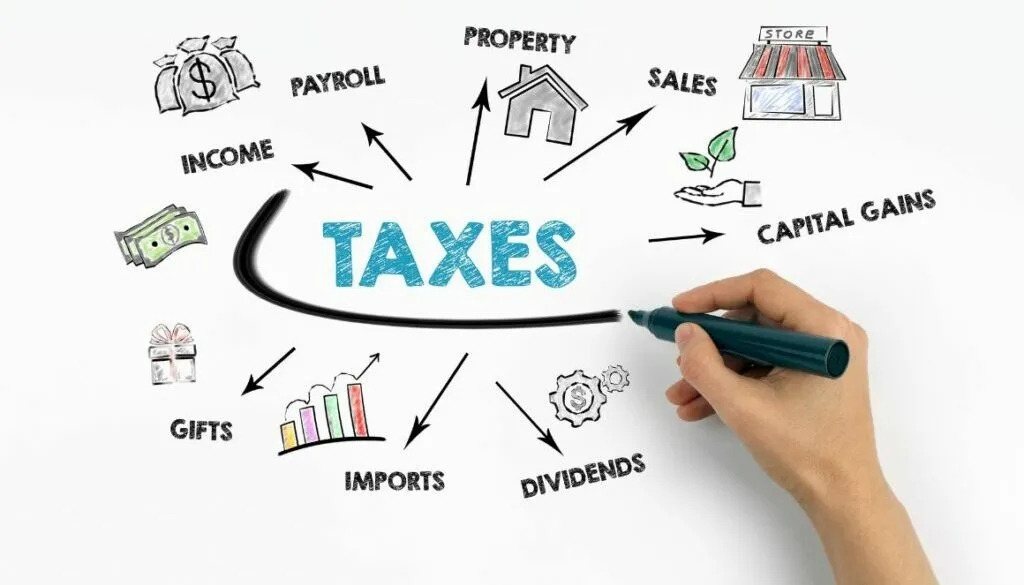If you're diving into the world of freelancing through platforms like Fiverr, understanding how taxes work is crucial. Fiverr has opened doors for countless freelancers, allowing them to showcase their skills and earn money from clients around the globe. However, with this financial freedom comes the responsibility of managing taxes. Whether you're new to freelancing or have been in the game for a while, grasping the tax implications of your earnings on Fiverr ensures that you're prepared for the IRS (or your local tax authority) come tax time.
Understanding Fiverr's Payment Structure

To effectively manage your taxes, it’s essential to grasp Fiverr’s payment structure. Here’s a breakdown of how money flows when you complete gigs on this platform:
- Gig Pricing: You set the price for your services (gigs). This is the starting point of your income.
- Service Fees: Fiverr takes a commission on your earnings. As of now, this fee is typically 20% of your total earnings (after any discounts). For example, if you charge $100 for a gig, Fiverr will take $20, leaving you with $80.
- Withdrawal Options: Once you've earned money, you'll need to withdraw it. Fiverr offers several options, such as PayPal, bank transfer, and Fiverr Revenue Card. Each option may have different processing times and fees.
- Payment Timeline: After a buyer places an order, Fiverr holds the payment for a certain period (usually 14 days for new sellers). This ensures that buyers have time to approve the work before you can access the funds.
- Tip Earnings: You might also receive tips from clients, which is an additional income that is subject to tax like your regular earnings.
Understanding these components will not only help you with budgeting but also in accurately reporting your income when tax season rolls around. Make sure to keep detailed records of all your Fiverr transactions for easy tax filing!
Also Read This: How to Change Your Phone Number on Fiverr
3. Tax Responsibilities for Fiverr Sellers

When you jump into the world of freelancing on Fiverr, it's crucial to understand your tax responsibilities as a seller. Since Fiverr functions as a platform for independent contractors, you'll be responsible for reporting and paying taxes on the income you earn. Here’s a breakdown of what you need to know:
- Income Reporting: All income earned through Fiverr is taxable, even if you don't receive a 1099 form. It's your responsibility to keep track of all your earnings and report them on your tax return.
- Self-Employment Tax: As a Fiverr seller, you're classified as self-employed. This means you'll need to pay self-employment taxes, which encompass Social Security and Medicare taxes. Be prepared to calculate these amounts when you file your taxes.
- Business Expenses: You can deduct many business-related expenses, such as software costs, internet charges, and marketing fees. Keeping detailed records of your expenses can significantly reduce your taxable income.
- Estimated Taxes: If you expect to owe at least $1,000 in taxes, the IRS requires you to pay estimated taxes quarterly. This practice helps you avoid a hefty tax bill at the end of the year.
To sum it up, understanding the tax landscape as a Fiverr seller isn’t all that complicated—but it does require diligence. So, keep your records organized, know what you need to report, and most importantly, don’t forget to set aside money for those tax payments!
Also Read This: Can I Message Previous Fiverr Customers?
4. Tax Obligations for Fiverr Buyers

So, you’re a buyer on Fiverr, looking to snag some top-notch freelance services. But guess what? You also have some tax obligations to keep in mind! Let’s unravel what that looks like:
- Tax on Purchases: Generally, if you buy a service from Fiverr, you may be subject to sales tax, depending on the location of the seller and the nature of the services rendered. Make sure to check your local tax regulations.
- Business Deductions: If you’re obtaining services for a business, the expenses can often be deductible. Documenting these purchases and their purposes will come in handy when tax season rolls around!
- International Buyers: If you’re purchasing services from sellers in different countries, be aware of potential currency conversion fees and how they might impact the overall price you pay.
- Record Keeping: Keep track of all your Fiverr purchases. This not only simplifies your own accounting but can also make your life much easier should the tax authorities come knocking for details.
In summary, while your responsibilities as a Fiverr buyer may not seem as extensive as those for sellers, staying informed can save you from surprises down the road. So, next time you click “buy,” just keep these tax factors in the back of your mind!
Also Read This: Effortless Document Enhancement: Making Quillbot Work on Docs
How to Track Your Earnings on Fiverr

Tracking your earnings on Fiverr is crucial, especially when tax season rolls around. You want to ensure you have accurate records of what you've made so that you can report it correctly to tax authorities. So, how do you keep tabs on your Fiverr income?
Fiverr provides an easy way to monitor your earnings through your account dashboard. Here’s what you should do:
- Log in to your Fiverr account: Your dashboard will give you a comprehensive view of your earnings.
- Go to "Analytics": Here, you can see your total earnings, orders completed, and more.
- Export Reports: You can download reports of your earnings in various formats. This can be very handy for tax filing.
In addition to Fiverr’s built-in tracking tools, you might consider using external methods to further simplify your recordkeeping:
- Spreadsheets: Creating your own spreadsheet using Excel or Google Sheets can help you track individual gigs, tips, and expenses.
- Accounting Software: Tools like QuickBooks or FreshBooks can automate tracking and integrate easily with your Fiverr income.
Don’t forget to keep copies of any invoices or receipts associated with your Fiverr gigs. Keeping organized records can save you a ton of headaches come tax time!
Also Read This: Can’t Sign Up for Fiverr? Here’s What You Need to Know
Common Tax Deductions for Freelancers
Freelancing can sometimes feel overwhelming, particularly when it comes to understanding taxes. But here’s a silver lining: freelancers often have access to various tax deductions that can help reduce your overall tax liability. Let’s break it down!
Here are some common tax deductions that freelancers can make the most of:
- Home Office Deduction: If you work from home, you can deduct expenses related to your workspace. This includes a portion of your rent, utilities, and internet bill.
- Business Expenses: Any expenses directly related to your business are deductible. This could include software subscriptions, marketing costs, and equipment purchases.
- Travel Expenses: If you travel for business, you can deduct those costs as well, including airfare, accommodation, and meals.
- Health Insurance Premiums: If you’re self-employed, your health insurance premiums may be deductible, which is a significant saving.
- Education and Training: Any courses or workshops that improve your skills related to your freelance work can often be written off.
Be sure to keep thorough records and receipts for everything you plan to deduct. It’s smart to consult with a tax professional to ensure you’re maximizing your deductions while complying with tax laws. Remember, keeping well-organized documents not only eases your tax filing but also gives you peace of mind!
Also Read This: Can You Change a Fiverr Review? Everything You Need to Know
7. Filing Taxes as a Fiverr Seller
Filing taxes as a Fiverr seller may seem daunting at first, but with a bit of understanding, you can navigate the process smoothly. As a freelancer, you're considered self-employed, which comes with its own set of responsibilities. Let’s break them down!
First off, you need to keep track of your earnings. Fiverr provides you with a report that summarizes your income, but it's essential to maintain your own records, too. A simple spreadsheet can help you monitor:
- Gross Income: Total earnings before any deductions.
- Expenses: Any business-related costs, like software, marketing, or Fiverr fees.
At tax time, you'll typically need to file a few forms. Here’s a quick overview:
| Form | Purpose |
|---|---|
| Schedule C | To report income and expenses from self-employment. |
| Form 1040 | The main income tax form that includes your total income. |
| Schedule SE | To calculate your self-employment tax. |
Don’t forget about state taxes if they apply to you. Each state has its own laws and tax rates, so research those carefully!
If this feels overwhelming, consider speaking with a tax professional who can provide personalized advice. With the right preparation, filing taxes as a Fiverr seller can be just another part of your freelancing journey.
Also Read This: Where Can I Promote My Fiverr Gig 2018?
8. Self-Employment Tax Overview
As a Fiverr seller, you're classified as self-employed, which means you're responsible for paying self-employment taxes. So, what does that entail? Let’s dive in!
Self-employment tax covers your contributions to Social Security and Medicare, which are typically withheld from employee paychecks by employers. However, as a freelancer, you'll foot the entire bill yourself. This is where things get interesting!
- Current Self-Employment Tax Rate: The total self-employment tax rate is 15.3%. This is split into two parts:
- 12.4% for Social Security
- 2.9% for Medicare
Keep in mind that you can deduct half of your self-employment tax when filing your income taxes, which can provide some relief. It’s essential to stay organized and keep records of your gross earnings and any related expenses throughout the year. This makes calculating your self-employment tax much easier!
A common pitfall for many new sellers is forgetting to set aside a portion of their earnings for taxes. A good rule of thumb is to save around 25-30% of your income. You can deposit this into a separate account specifically for tax purposes.
In summary, being self-employed comes with some responsibilities, but understanding self-employment tax is a significant step toward managing your finances as a Fiverr seller. Planning ahead will ensure you're prepared when tax season rolls around!
Also Read This: How to Put a Gig on Fiverr: A Step-by-Step Guide
9. Tips for Managing Taxes as a Freelancer
Managing taxes as a freelancer can feel overwhelming at times, especially with the varying incomes and tax responsibilities that come into play. But don’t worry! Here are some straightforward tips to help you navigate the tax landscape effectively:
- Track Your Income and Expenses: Make it a habit to maintain a detailed record of all your earnings and expenses. Use accounting software or a simple spreadsheet to log each transaction. This will simplify your tax reporting and help ensure you’re not missing any deductions.
- Set Aside Money for Taxes: Unlike regular employees, freelancers typically don’t have taxes withheld from their pay. A good rule of thumb is to set aside about 25-30% of your income for taxes. This approach can help you avoid any nasty surprises come tax season.
- Know Your Deductions: Being a freelancer means you may qualify for various deductions such as home office expenses, internet and phone costs, and even some business equipment purchases. Educate yourself on what qualifies to maximize your deductions.
- Consider Quarterly Payments: To stay on top of your tax obligations, consider making quarterly estimated tax payments to the IRS. This can help you avoid penalties and keep your finances in check throughout the year.
- Work with a Tax Professional: If you feel lost or overwhelmed, don’t hesitate to consult a tax professional who understands freelance income. Their expertise can save you time and help you understand the nuances of your tax situation.
By implementing these tips, you can manage your freelance taxes with greater confidence, allowing you to focus more on your work and less on the stress of tax season.
10. Conclusion: Staying Compliant and Informed
In conclusion, understanding how taxes work with Fiverr and as a freelancer is essential for anyone aiming for long-term success in their freelance career. Taxes might seem a bit daunting, but with the right knowledge and practices, you can turn this responsibility into a manageable part of your business.
Here’s a quick recap to keep you informed:
- Always track your income and expenses.
- Create a system for saving for taxes regularly.
- Stay informed about deductions relevant to freelancers.
- Consider making quarterly tax payments to avoid penalties.
- Don’t hesitate to seek help from a tax professional.
Staying compliant means regularly updating yourself about tax changes, especially those that affect freelancers. By being proactive, you’ll ensure you keep Uncle Sam happy while allowing your business to thrive. Remember, being informed is half the battle. Embrace your freelance journey with confidence and tax savvy!



